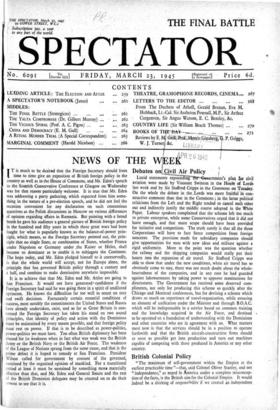NEWS OF THE WEEK pn 145 T is much to be
desired that the Foreign Secretary should from I time to time give an exposition of British foreign policy in the country as well as in the House of Commons, and Mr. Eden's speech to the Scottish Conservative Conference at Glasgow on Wednesday was for that reason particularly welcome. It is true that Mr. Eden was addressing a party gathering, which expected from him some- thing in the nature of a pre-election speech, and he did not feel the occasion convenient for any declaration on such contentious questions as the Polish discussions in Moscow on various differences of opinion regarding affairs in Rumania. But painting with a broad brush he gave his audience a general picture of British foreign policy in the hundred and fifty years in which three great wars had been fought for what is popularly known as the balance-of-power prin- ciple, which means, as the Foreign Secretary pointed out, the prin- ciple that no single State, or combination of States, whether France under Napoleon or Germany under the Kaiser or Hitler, shall become so dominant as to enable it. to subjugate the Continent. The hope today, and Mr. Eden pledged himself to it unreservedly, is that the whole world will accept, not for Europe alone, the principle that has governed British policy through a century and a half, and combine to make domination anywhere impossible.
It is to achieve that that Mr. Eden and Mr. Attlee are going to San Francisco. It would not have generated- confidence if the Foreign Secretary had said he was going there in a spirit of undiluted optimism. He knows the difficulties far too well to count on easy and swift decisions. Fortunately certain essential conditions of success, most notably the commitments the United States and Russia have already undertaken, exist, and so far as Great Britain is con- cerned the Foreign Secretary has taken his stand on two sound principles, that identity of policy and action with the Dominions must be maintained by every means possible, and that foreign policy must rest on power. If that is to be described as power-politics, power-politics we must have. Too often British diplomacy has been abused for its weakness when in fact vihat was weak was the British Army or the British Navy or the British Air Force. The weakness of the League of Nations sprang from the same cause, and that is the prime defect it is hoped to remedy at San Francisco. President Wilson called for government by consent of the governed, sustained by the organised opinion of mankind. For a transitional period at least it must be sustained by something more materially effective than that, and Mr. Eden and General Smuts and the rest of the British Dominion delegates may be counted on to do their umost to see that it is.


























